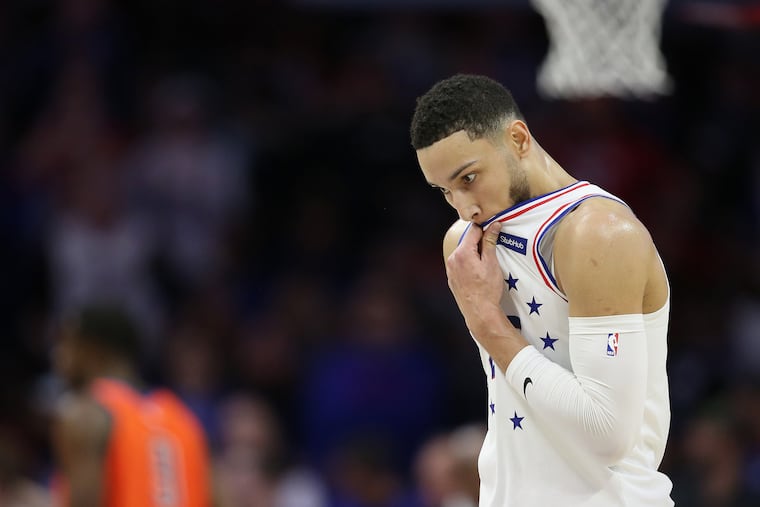Sixers-Thunder final seconds review: Ben Simmons' choices, Jimmy Butler’s foul and more
Breaking down what went wrong for the Sixers down the stretch against the Thunder.

Ben Simmons had three choices as the clock was winding down on Saturday; shoot, drive, or give the ball to someone else. He chose to hand the ball off to Jimmy Butler who missed a shot at the buzzer and the Sixers lost, 117-115.
Paul George had just completed a four-point play after Butler fouled him on a three-point shot with just 5.1 seconds left. The Sixers were slow getting the ball in after George’s free throw. Once Simmons had the ball he drove down the right side of the court.
“We’re trying to create an environment where Ben can attack the best he could, keep the court spread,” Brett Brown said after the loss. “At that point you’re begging. Five seconds left, no timeouts, you’re trying to get whatever you can.”
Simmons said he saw Steven Adams to his left and assumed Adams would drop down to cut off a driving lane. Additionally Jerami Grant was waiting in the paint looking to help on anyone that would come into the area. So Simmons stoped at the three-point line, handed the ball off to Butler, tried to screen Terrance Ferguson to give Butler room, and the rest is history.
Simmons' reasoning makes sense and his choice is understandable, but there were other options. It’s not like Simmons hasn’t made shots in traffic or through contact before, which is what he would have had to do if he had decided to drive toward the basket.
Had Simmons pulled up for the shot himself not only would it have been the shock of the season, but he probably would have ended up with more room to shoot than Butler had. Simmons even admitted that he thought about taking the shot.
“I was about to,” he said. “I saw Jimmy’s man sag a little bit more so I went to the handoff.”
But, Simmons’ screen for Butler didn’t work that well and Ferguson worked with George to double-team Butler creating a tough, contested last look.
Simmons not wanting to take that shot is not surprising, but it’s also still a problem. In last second situations, controlling the ball and with enough room to get a shot off, eventually the Sixers are going to need Simmons willing to be the guy that takes the last shot. If he’d pulled up or even driven in a couple feet before pulling up and missed there could have been time for a put-back or a tip-in.
But, as Butler said, if it wasn’t for his foul on the previous possession, the Sixers would have been looking at a different end-of-game situation.
After Joel Embiid hit three clutch free throws to tie the game, the Sixers put on a full-court press to trap the ball in the backcourt, and it worked. Butler came up with a steal and an easy two points to take the lead 115-113. Then the Thunder called timeout.
With Westbrook having already fouled out of the game, everyone in the Wells Fargo Center that it was going to be George taking the last shot. Butler, being a veteran player, knew that George was going to take a shot, no matter how difficult, and he should have known not to foul him.
“Shoot a three, if it went in we would have won, it didn’t, we lost,” Butler said. “But I don’t even think we’re in that position if I guard, and don’t foul and let P.G. make the shot.”
The Sixers had to fight to stay in the game through the night and the fact that they were right there with the Thunder in the end is a positive sign. The decisions in the last moments of the game, Embiid said, come down to communication, which needs to improve.
The goal for the Sixers is to take the tough loss to the Thunder and use it to get better. After a film session on Sunday, and reviewing late-game situations — who is taking the final shot, what to do with five, four, three, or two seconds on the clock, the need for urgency to get the ball in at the end of a game with no timeouts, whether or not to go for the win or force overtime — the Sixers will have no choice but to come away with a more well-rounded plan should they end up in a similar scenario down the road.
“In those type of situations any team on the road is going to go for the three, and we should have known that,” Embiid said. “Worst case scenario the score is two and we’ve still got time and we go to overtime at home and I’ll take that any day. We just have to make sure we’re aware of those type of situations.”